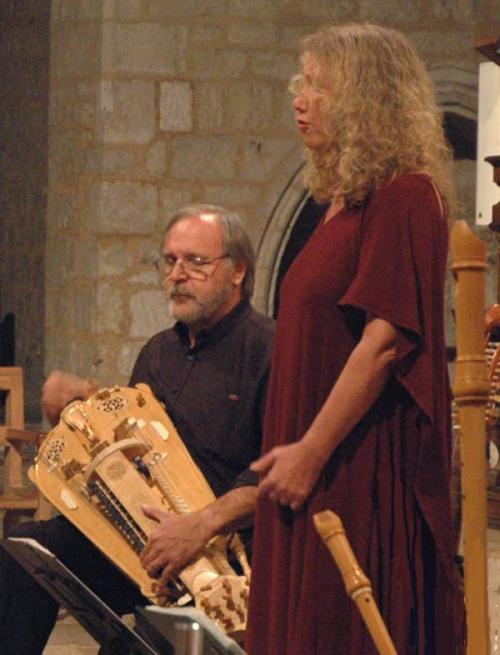La première année que je me suis mariée
il m'a fait marcher tout le long d'une année
dessus des épines qu'on venait de planter,
dessus des épines qu'on venait de planter.
La deuxième année que je me suis mariée
il m'a tiré mon cher petit enfant
il l'a jeté à ses chiens dévorants,
il l'a jeté à ses chiens dévorants.
La troisième année que je me suis mariée
il m'a fait monter là-haut de la tour,
c'était pour voir si mon frère revenait,
c'était pour voir si mon frère revenait.
“Si ton frère demande où elles sont tes couleurs,
tu lui répondras: C'est malade que j'étais.
Prenez égard à ce que vous direz,
prenez égard à ce que vous direz.”
“Bonjour, ma sœur! Où elles sont tes couleurs?”
Elle dit tout haut: “C'est malade que j'étais.”
Elle dit tout bas: “Méchant mari que j'ai”,
Elle dit tout bas: “Méchant mari que j'ai.”
“Bonjour, ma sœur! Où est ton cher enfant?”
Elle dit tout haut: “Est mort et enterré.”
Elle dit tout bas: “À ses chiens dévoré”,
Elle dit tout bas: “À ses chiens dévoré”.
“Bonjour, ma sœur! Où est ton cher mari?”
Elle dit tout haut: “À la chasse est allé.”
Elle dit tout bas: “Derrière l'armoire caché”,
Elle dit tout bas: “Derrière l'armoire caché.”
“Sors de là, bourreau, sors de là que je te tue,
de mon fusil je vais, je vais te fusiller,
de mon épée je vais, je vais te traverser,
de mon épée je vais, je vais te traverser.”
il m'a fait marcher tout le long d'une année
dessus des épines qu'on venait de planter,
dessus des épines qu'on venait de planter.
La deuxième année que je me suis mariée
il m'a tiré mon cher petit enfant
il l'a jeté à ses chiens dévorants,
il l'a jeté à ses chiens dévorants.
La troisième année que je me suis mariée
il m'a fait monter là-haut de la tour,
c'était pour voir si mon frère revenait,
c'était pour voir si mon frère revenait.
“Si ton frère demande où elles sont tes couleurs,
tu lui répondras: C'est malade que j'étais.
Prenez égard à ce que vous direz,
prenez égard à ce que vous direz.”
“Bonjour, ma sœur! Où elles sont tes couleurs?”
Elle dit tout haut: “C'est malade que j'étais.”
Elle dit tout bas: “Méchant mari que j'ai”,
Elle dit tout bas: “Méchant mari que j'ai.”
“Bonjour, ma sœur! Où est ton cher enfant?”
Elle dit tout haut: “Est mort et enterré.”
Elle dit tout bas: “À ses chiens dévoré”,
Elle dit tout bas: “À ses chiens dévoré”.
“Bonjour, ma sœur! Où est ton cher mari?”
Elle dit tout haut: “À la chasse est allé.”
Elle dit tout bas: “Derrière l'armoire caché”,
Elle dit tout bas: “Derrière l'armoire caché.”
“Sors de là, bourreau, sors de là que je te tue,
de mon fusil je vais, je vais te fusiller,
de mon épée je vais, je vais te traverser,
de mon épée je vais, je vais te traverser.”
envoyé par Riccardo Venturi - 6/6/2012 - 00:01
Langue: italien
Traduzione italiana di Riccardo Venturi
6 giugno 2012

6 giugno 2012

Véronique Chalot oggi.
LA MALMARITATA VENDICATA DAL FRATELLO
Il primo anno che ero sposata
lui m'ha fatta camminare per tutta un'annata
sopra delle spine appena piantate,
sopra delle spine appena piantate.
Il secondo anno che ero sposata
lui mi ha tolto il mio caro piccino
e l'ha gettato in pasto ai suoi cani feroci,
e l'ha gettato in pasto ai suoi cani feroci.
Il terzo anno che ero sposata
mi ha fatta salire lassù sulla torre,
era per vedere se mio fratello tornava,
era per vedere se mio fratello tornava.
« Se tuo fratello ti chiede perché sei pallida
tu gli risponderai: Perché ero malata.
Fai parecchia attenzione a quel che gli dirai,
fai parecchia attenzione a quel che gli dirai. »
« Salve, sorella mia! Perché sei così pallida? »
Lei dice a voce alta: « Perché ero malata. »
Poi dice a voce bassa: « Perché ho un marito malvagio »,
Poi dice a voce bassa: « Perché ho un marito malvagio. »
« Salve, sorella mia! Dov'è il tuo caro bambino? »
Lei dice a voce alta: « È morto e sotterrato. »
Poi dice a voce bassa: « Dai suoi cani divorato »,
Poi dice a voce bassa: « Dai suoi cani divorato ».
« Salve, sorella mia! Dov'è il tuo caro marito? »
Lei dice a voce alta: « È andato a caccia. »
Poi dice a voce bassa: « Nascosto dietro l'armadio »,
Poi dice a voce bassa: « Nascosto dietro l'armadio ».
« Esci di là, boia, esci di là che ti ammazzo,
col mio fucile, col mio fucile ti sparerò,
con la mia spada, con la mia spada ti trapasserò,
con la mia spada, con la mia spada ti trapasserò. »
Il primo anno che ero sposata
lui m'ha fatta camminare per tutta un'annata
sopra delle spine appena piantate,
sopra delle spine appena piantate.
Il secondo anno che ero sposata
lui mi ha tolto il mio caro piccino
e l'ha gettato in pasto ai suoi cani feroci,
e l'ha gettato in pasto ai suoi cani feroci.
Il terzo anno che ero sposata
mi ha fatta salire lassù sulla torre,
era per vedere se mio fratello tornava,
era per vedere se mio fratello tornava.
« Se tuo fratello ti chiede perché sei pallida
tu gli risponderai: Perché ero malata.
Fai parecchia attenzione a quel che gli dirai,
fai parecchia attenzione a quel che gli dirai. »
« Salve, sorella mia! Perché sei così pallida? »
Lei dice a voce alta: « Perché ero malata. »
Poi dice a voce bassa: « Perché ho un marito malvagio »,
Poi dice a voce bassa: « Perché ho un marito malvagio. »
« Salve, sorella mia! Dov'è il tuo caro bambino? »
Lei dice a voce alta: « È morto e sotterrato. »
Poi dice a voce bassa: « Dai suoi cani divorato »,
Poi dice a voce bassa: « Dai suoi cani divorato ».
« Salve, sorella mia! Dov'è il tuo caro marito? »
Lei dice a voce alta: « È andato a caccia. »
Poi dice a voce bassa: « Nascosto dietro l'armadio »,
Poi dice a voce bassa: « Nascosto dietro l'armadio ».
« Esci di là, boia, esci di là che ti ammazzo,
col mio fucile, col mio fucile ti sparerò,
con la mia spada, con la mia spada ti trapasserò,
con la mia spada, con la mia spada ti trapasserò. »
Langue: anglais
English translation / Traduzione inglese / Traduction anglaise / Englanninkielinen käännös: Tom Harper
Thank you to the original poster for the French lyrics; this is a beautiful song.
I have made a rough English translation in case any other English speakers like myself stumble on this page.
I have made a rough English translation in case any other English speakers like myself stumble on this page.
The first year that I was married
He made me walk for the whole year
Upon thorns that had just been planted,
Upon thorns that had just been planted.
The second year that I was married
He shot my dear little child
He threw it to his ravenous dogs,
He threw it to his ravenous dogs.
The third year that I was married
He made me climb up the tower,
To see if my brother was returning,
To see if my brother was returning.
"If your brother asks why your face has no color,
you will tell him: ‘I have been ill.’
Be careful of what you say,
Be careful of what you say."
"Hello my sister! Why does your face have no color?"
She says aloud, "I have been ill."
She whispers: "I have a cruel husband,"
She whispers: "I have a cruel husband."
"Hello my sister! Where is your dear child?"
She says aloud, "Dead and buried."
She whispers, "Devoured by his dogs,"
She whispers, "Devoured by his dogs."
"Hello my sister! Where is your dear husband?"
She says aloud: "Gone out to hunt."
She whispers: "Behind the hidden wardrobe,"
She whispers, "Behind the hidden wardrobe."
"Get out of there, torturer, get out of there so I can kill you,
With my rifle I will shoot you,
With my sword I will run you through,
With my sword I will run you through."
He made me walk for the whole year
Upon thorns that had just been planted,
Upon thorns that had just been planted.
The second year that I was married
He shot my dear little child
He threw it to his ravenous dogs,
He threw it to his ravenous dogs.
The third year that I was married
He made me climb up the tower,
To see if my brother was returning,
To see if my brother was returning.
"If your brother asks why your face has no color,
you will tell him: ‘I have been ill.’
Be careful of what you say,
Be careful of what you say."
"Hello my sister! Why does your face have no color?"
She says aloud, "I have been ill."
She whispers: "I have a cruel husband,"
She whispers: "I have a cruel husband."
"Hello my sister! Where is your dear child?"
She says aloud, "Dead and buried."
She whispers, "Devoured by his dogs,"
She whispers, "Devoured by his dogs."
"Hello my sister! Where is your dear husband?"
She says aloud: "Gone out to hunt."
She whispers: "Behind the hidden wardrobe,"
She whispers, "Behind the hidden wardrobe."
"Get out of there, torturer, get out of there so I can kill you,
With my rifle I will shoot you,
With my sword I will run you through,
With my sword I will run you through."
envoyé par Tom Harper - 25/8/2018 - 02:46
Langue: russe
Traduzione russa / Traduction russe / Russian translation / Venäjänkielinen käännös:
Dimmi Chaltre (L. Trans.)
Dimmi Chaltre (L. Trans.)
Несчастная молодая жена
Моего замужества в первый год
Заставлял он меня каждый день
По тёрну, что месяц посажен, ступать босой.
По тёрну, что месяц посажен, ступать босой.
Моего замужества в год второй
Вырвал он у меня дитя,
Чтоб кинуть своим ненасытным псам.
Чтоб кинуть своим ненасытным псам.
Моего замужества в третий год
Башни замка наверх отвел,
Чтоб я поглядела, не скачет ли брат мой родной.
Чтоб я поглядела, не скачет ли брат мой родной.
"На брата вопрос, куда делся румянец твой,
Отвечай, что больна была.
И горе тебе, если скажешь не так!"
"И горе тебе, если скажешь не так!"
"Здравствуй, сестра! Где ж веселый румянец твой?"
Молвит в голос: "Больна я была."
Молвит слышно едва: "Злого мужа дела."
Молвит слышно едва: "Злого мужа дела."
"Здравствуй, сестра! А милое где же твое дитя?"
Молвит в голос: "Покоится с миром в земле."
Молвит слышно едва: "Кинул псам забавы для."
Молвит слышно едва: "Кинул псам забавы для."
"Здравствуй, сестра! А где ж твой любезный супруг?"
Молвит в голос: "В лесах охотится он."
Молвит слышно едва: "За шкафом таится он."
Молвит слышно едва: "За шкафом таится он."
"Прочь оттуда, злодей, выходи, чтоб принять свою смерть!
Из ружья моего, из ружья я тебя застрелю!
Шпагой острой своей, шпагой острой тебя заколю!"
Шпагой острой своей, шпагой острой тебя заколю!"
Моего замужества в первый год
Заставлял он меня каждый день
По тёрну, что месяц посажен, ступать босой.
По тёрну, что месяц посажен, ступать босой.
Моего замужества в год второй
Вырвал он у меня дитя,
Чтоб кинуть своим ненасытным псам.
Чтоб кинуть своим ненасытным псам.
Моего замужества в третий год
Башни замка наверх отвел,
Чтоб я поглядела, не скачет ли брат мой родной.
Чтоб я поглядела, не скачет ли брат мой родной.
"На брата вопрос, куда делся румянец твой,
Отвечай, что больна была.
И горе тебе, если скажешь не так!"
"И горе тебе, если скажешь не так!"
"Здравствуй, сестра! Где ж веселый румянец твой?"
Молвит в голос: "Больна я была."
Молвит слышно едва: "Злого мужа дела."
Молвит слышно едва: "Злого мужа дела."
"Здравствуй, сестра! А милое где же твое дитя?"
Молвит в голос: "Покоится с миром в земле."
Молвит слышно едва: "Кинул псам забавы для."
Молвит слышно едва: "Кинул псам забавы для."
"Здравствуй, сестра! А где ж твой любезный супруг?"
Молвит в голос: "В лесах охотится он."
Молвит слышно едва: "За шкафом таится он."
Молвит слышно едва: "За шкафом таится он."
"Прочь оттуда, злодей, выходи, чтоб принять свою смерть!
Из ружья моего, из ружья я тебя застрелю!
Шпагой острой своей, шпагой острой тебя заколю!"
Шпагой острой своей, шпагой острой тебя заколю!"
envoyé par Riccardo Venturi - 24/9/2020 - 18:19
×
![]()









Chanson populaire française d'époque inconnue
Interpretazione: Véronique Chalot, in J'ai vu le loup
(Materiali Sonori, 1978)
Interprétation: Véronique Chalot, dans J'ai vu le loup
(Materiali Sonori, 1978)
Il tema della "malmaritata" (maumariée, malmariée) è comune nelle ballate tradizionali francesi e occitante, quasi un τόπος; e quando qualcosa diviene un τόπος nella composizione popolare, che è fatta esclusivamente di storie, significa una cosa sola: che quel dato fatto era all'ordine del giorno. Lo stesso vale, ad esempio, per l'incesto e per i conflitti familiari (vale a dire le faide). La maumariée affiora nella letteratura colta in epoca assai remota: se ne trovano esempi nei lais della grande poetessa Maria di Francia, vissuta nella 2a metà del XII secolo. Quando un argomento affiora nella letteratura colta, significa che ha alle spalle un retroterra orale lungo secoli. Si tratta di un tema quasi ovvio, in un'epoca in cui i matrimoni erano combinati dalle famiglie per convenienza, e le figlie passavano dalla segregazione nella casa paterna a quella in casa di uno sconosciuto. Nelle tristi vicende delle tante maumariées si avverte una situazione reale; e quanto sia reale, lo si vede perfettamente ancora adesso. Questa canzone può essere di epoca più tarda, forse cinquecentesca; la contemporanea presenza di un'arma da fuoco (un fucile) e di una spada in mano al fratello vendicatore può far supporre che siamo proprio nel periodo di transizione tra l'uso dei due tipi di armi. Ma, lo ripeto, il tema della vicenda si perde nella notte dei tempi. La maumariée ha usualmente due tipi di marito: l'aguzzino di questa ballata, oppure il vecchio geloso. Le risoluzioni sono varie: si va dalla vendetta familiare fino alla storica (e, spesso, masochistica) accettazione di ogni sorta di vessazioni da parte del marito, dalla fuga col ritorno alla casa paterna alla morte. Le ballate del "vecchio geloso" si concludono però spesso con la sposina che fa cornuto il consorte con un bel giovanotto (ma non mancano esempi tragici anche per questo filone).
In rete, questa antica canzone ha un trattamento curioso. Non se ne trovano che pochi versi sparsi, dal "Livre de chansons" di Henri Davenson fino a un improbabile forum di "amours sucrés" adolescenziali (canzone meno "sucrée" e adolescenziale sarebbe difficile immaginarla). Alla fine, mi è toccato ricorrere alla cara, vecchia trascrizione all'ascolto dal video YouTube della (stupenda) interpretazione del 1978 della "nostra" Véronique Chalot; e, data la particolare dizione di Véronique, l'impresa non è stata semplice. Ho, quindi, come il presentimento che, per l'ennesima volta, questo sito fornisce per primo il testo completo di una data canzone. [RV]